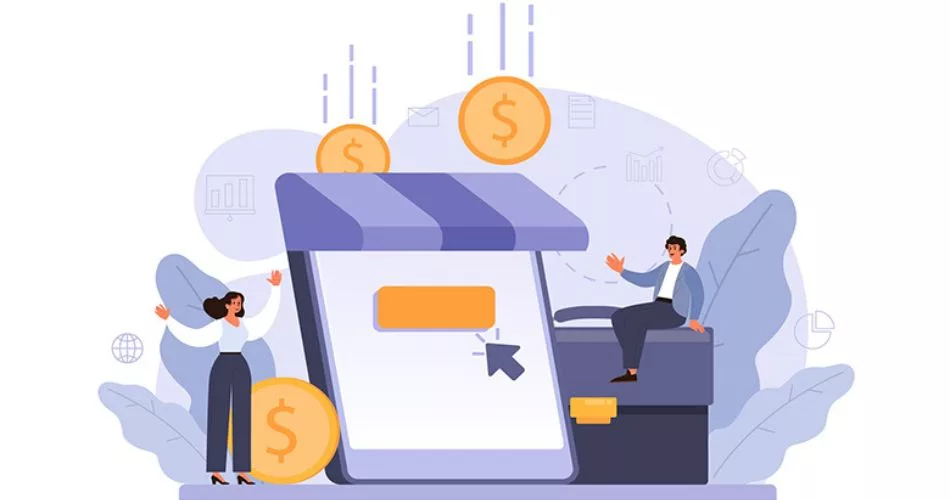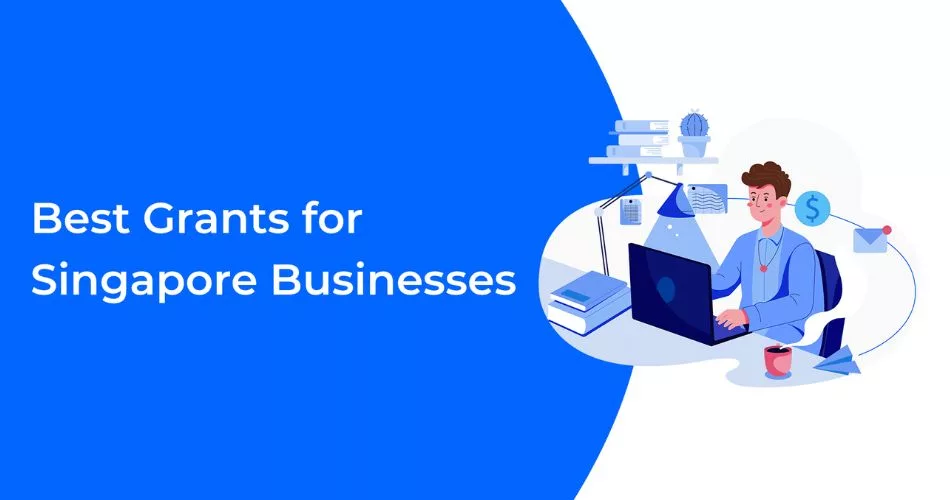Singapore’s booming startup scene isn’t just for well-funded ventures. Singapore’s startup grants can fuel your growth even if you’re a new entrepreneur with a small or medium (SME) business. Startup numbers have skyrocketed from 22,000 in 2003 to 48,000 in 2015, and local startups raised a staggering $14.7 billion in 2021, according to Strait Times. The momentum is clear, and government grants are a key driver.
This guide unlocks the treasure chest of SME grants in Singapore. We’ll explore specific opportunities, eligibility criteria, and real-world success stories. Whether you’re looking to adopt new technologies, expand globally, or boost productivity, these grants can be your springboard to success. Let’s dive in and discover how Singapore empowers your entrepreneurial journey!
Table of Contents
Eligibility Criteria for Singapore Grant Consulting
Before diving into the exciting world of Singapore’s startup grants, it’s crucial to assess your eligibility. Think of it as the gateway that unlocks access to valuable funding. By taking these essential steps, you will focus your efforts on grants your business is qualified for, maximizing your chances of securing the financial support you need to thrive. Let’s explore the four key criteria you’ll need to meet to apply for business grants in Singapore.

1. Identifying the Right SME Grants in Singapore
Before diving into applications, acquaint yourself with available government grants Singapore’s businesses. Align your business goals with programs that support your specific needs, whether it’s adopting new technologies, expanding internationally, or enhancing core capabilities. Once you’ve identified a suitable grant, ensure you meet the criteria. Common requirements include:
- Local Registration: Your business must be registered and operating in Singapore.
- Equity Ownership: Singaporeans or Permanent Residents must hold a minimum percentage of local equity.
- Financial Readiness: Demonstrate your company’s ability to complete the project financially.
2. Building a Winning Application
Having identified the perfect Singapore business grants, the next step is crafting a winning application that showcases your business and project’s potential. Here’s what you need to include:
- A Powerful Project Proposal: Develop a detailed proposal that outlines your project’s key elements:
- Clear Objectives and Expected Outcomes: Define your project’s goals to align with the grant’s objectives. Explain your aim and how the project will contribute to your business growth.
- Well-Defined Project Scope: Clearly outline the activities and deliverables encompassed by your project. This demonstrates a well-planned approach and ensures the project is achievable within the grant timeframe.
- Cost Breakdown: Prepare a detailed breakdown of all project-related costs and justify every dollar. Focus on expenses that are eligible for grant funding, such as:
- Consultancy Fees: Highlight the expertise you’ll gain by collaborating with certified grant consultants in Singapore.
- Software and Equipment: Detail any software or equipment needed for project execution and how it contributes to your goals.
- Manpower Costs: If applicable, outline the manpower required for the project and justify the associated costs.

3. Submitting and Securing Approval
Once you’ve crafted a compelling application, it’s time to submit it and secure the coveted grant funding. Here’s what to expect:
- Electronic Submission: Most applications are submitted electronically through a dedicated platform, such as the Business Grants Portal. Ensure you follow the specific submission process outlined for your chosen grant program.
- The Assessment Process: After submission, your application enters the evaluation stage. Reviewers will meticulously assess your proposal based on key criteria, including:
- Project Scope and Feasibility: They’ll evaluate the clarity and feasibility of your project plan, ensuring it’s achievable within the timeframe and aligns with the grant’s objectives.
- Anticipated Results and Impact: Reviewers will assess the potential impact of your project. Demonstrate how your project will contribute to your business goals and potentially benefit the broader economy.
- Service Provider Competency (if applicable): If your project involves collaboration with consultants, reviewers will assess their qualifications and expertise to ensure they possess the necessary skills to contribute to your success.
- Approval and Funding Disbursement: If your application meets all the requirements and impresses the reviewers, you’ll receive notification of approval. The grant funding will then be disbursed according to the specific terms and conditions outlined in the grant program.
4. Project Execution and Claiming Funds
Congratulations! Your application has been approved, and you’ve secured Singapore’s government grants for SME businesses. Now comes the exciting part: putting your project into action and claiming the allocated funds.
- Project Implementation: Execute the project, utilizing grant funds as designated. Regular reporting and compliance are crucial.
- Claim Process: Submit claims for eligible project costs incurred. Claims will be reviewed and processed.
Remember: Specific requirements and timelines may vary depending on your chosen startup funding in Singapore. For complex projects, consider leveraging the expertise of consultants, industry professionals, or government agency representatives. Their guidance can be invaluable in navigating the process effectively and ensuring a successful project outcome.

Case study: The EDG Grant
To better understand how a grant works, let’s look at how the EDG grant works. Among the government grants in Singapore, the Enterprise Development Grant (EDG) is a prime example of how the Enterprise Singapore grant empowers businesses. The EDG supports projects in three critical areas:
| Eligibility Criteria: | Local Registration: The business entity must be registered and operating in Singapore. Equity Ownership: At least 30% local equity held by Singaporean(s) and/or Singapore Permanent Resident(s). Financial Readiness: Demonstrate financial capacity to complete the project through financial indicators like the current ratio. Future Alignment: Employers eligible for the Skills Future Enterprise Credit can qualify for additional subsidies. |
| Funding Coverage: | The EDG supports a range of qualifying project costs: Third-Party Consultancy Fees: Engage certified management consultants for strategic guidance. Software and Equipment: Invest in technology solutions that enhance productivity and competitiveness. Internal Manpower Cost: Allocate resources for project execution.Support Levels: Local SMEs: Receive up to 50% support for eligible costs. Sustainability Projects: From April 1, 2023, projects with a sustainability focus may be supported at up to 70%. |
| Application Process: | Businesses submit individual project proposals detailing their business plans and expected outcomes. Enterprise Singapore (EnterpriseSG) assesses applications based on project scope, outcomes, and the competency of the service provider. By leveraging Singapore’s grant system and following these steps, you can unlock valuable funding and pave the way for your business to thrive. |
Suitable Business Grant Areas in Singapore
Understanding how each grant area intersects with your business goals is key to crafting a winning application for any SME grants in Singapore. Focus on proving or highlighting these areas is the key to your success in winning a grant. Here’s how the core focus areas can elevate your grant application:

1. Core Capabilities
This area strengthens your business fundamentals, preparing you for sustainable growth:
- Business Strategy Development: A well-defined business strategy aligned with the grant’s objectives is crucial. Clearly outline your vision, mission, and long-term goals to demonstrate focus and clarity.
- Financial Management Optimization: Demonstrate financial readiness through efficient practices. Effective budgeting, cash flow management, and investment decisions showcase your ability to handle grant funds responsibly.
- Human Capital Development: Investing in your workforce is essential for successful project execution. Highlight your approach to talent development, including addressing skill gaps and succession planning.
- Service Excellence: Prioritizing customer experiences is paramount. Training your team and streamlining processes will contribute to positive project outcomes.
- Strategic Brand and Marketing Development: A strong brand identity and effective marketing campaigns enhance competitiveness. Showcase your brand strategy and how it aligns with the grant’s objectives.
2. Innovation & Productivity
This area empowers you to embrace cutting-edge solutions for enhanced efficiency:
- Technology Adoption: Leveraging digital solutions demonstrates a forward-thinking approach. Show how technology aligns with your project goals and increases productivity and competitiveness.
- Process Innovation: Streamlining operations and workflows paves the way for success. Highlight how innovative processes lead to efficiency gains and resource optimization.
- Productivity Enhancement: Maximizing output with minimal resources is key to business sustainability. Demonstrate how your project contributes to overall productivity and profitability.
3. Market Access
This area empowers businesses venturing into the global marketplace:
- Internationalization: For projects focused on overseas expansion, emphasize your market entry strategies and readiness for global reach. Outline your plans for navigating international markets.
- Market Entry Activities: Showcase your understanding of the target market. Highlight your research on regulatory frameworks, cultural nuances, and market dynamics. This demonstrates a comprehensive approach to internationalization.
- Export Promotion: If your project aims to promote Singaporean products or services overseas, clearly outline how it contributes to this objective.
Aligning your project proposal with the specific grant area is key. Clearly articulate how your project addresses the grant’s objectives and contributes to your business’s growth and transformation. By understanding the focus areas and tailoring your proposal accordingly, you’ll significantly increase your chances of securing government grants for businesses and achieving your goals.
Guide to Applying for Government Business Grants in Singapore
Ready to unlock the power of Singapore’s government grants? Here’s a breakdown of the application process in three essential steps:

Step 1: Finding the Perfect Fit
Before diving in, identify the grant category that best aligns with your project. Consider if your project falls under:
- Core Capabilities: Strengthening your business fundamentals (e.g., strategy development, financial management).
- Innovation & Productivity: Embracing technology and process innovation to enhance efficiency.
- Market Access: Expanding your reach through internationalization and export promotion.
Each category has distinct objectives and eligibility criteria. Carefully analyze your project goals and choose Singapore’s government grants for SME businesses that offer the most relevant support.
Step 2: Building a Compelling Application
Once you’ve identified the right startup funding in Singapore, prepare the necessary documents to showcase your project’s potential:
- Project Proposal: Craft a clear and concise proposal outlining your project’s scope, objectives, and expected outcomes. Explain how your project aligns with the grant’s specific goals.
- Financial Statements: Demonstrate your financial readiness by providing recent financial statements and highlighting relevant indicators like your current ratio.
- Consultancy Agreements (if applicable): Include agreements with certified management consultants or service providers who will be involved in the project.
- Supporting Documents: Depending on the grant, you may need additional documents such as details on technology adoption plans, market research findings, or internationalization strategies. Gather everything required for your chosen program.
Step 3: Submitting Your Application Electronically
The Business Grant Portal (BGP) is your one-stop shop for submitting grant applications. Here’s how to navigate the portal:
- Register: Create an account on the BGP if you haven’t already.
- Log In: Access the portal using your registered credentials.
- Select Grant: Choose the specific grant program you’re applying for.
- Complete Application Form: Carefully fill out the required details, meticulously upload all your supporting documents, and ensure all information is accurate and complete.
- Submit: Review your application thoroughly, double-check that all documents are attached, and then submit it electronically through the BGP.
Remember: Stay informed. Grant policies can evolve. Subscribe to updates or partner with a grants advisory in Singapore to ensure your application remains competitive.
Overview of the Most Popular SME Grants in Singapore
Singapore’s vibrant business environment is fueled by a robust grant system specifically designed to empower SMEs. Let’s explore some of the most popular business grants in Singapore that can propel your business growth and development:

1. Enterprise Development Grant (EDG)
- Objective: The EDG is a cornerstone program that provides support for enhancing business capabilities, fostering innovation, and driving sustainable growth.
- Focus Areas: Core capabilities development, technology adoption & process innovation, and market access initiatives.
- Eligibility: Registered and operating in Singapore with at least 30% local equity, and demonstrating financial readiness for project execution.
- Application: Submit your application electronically through the Business Grant Portal using your CorpPass.
2. Market Readiness Assistance (MRA)
- Objective: The MRA empowers SMEs to take their first steps into the global arena by facilitating internationalization and market entry.
- Focus: Support for overseas market research, participation in trade fairs, and international marketing campaigns.
- Eligibility: SMEs venturing overseas for the first time, meeting specific criteria on annual sales turnover and local employees.
- Application: Follow the application guidelines outlined on the Business Grant Portal.
3. StartupSG Founder:
- Objective: This program ignites Singapore’s entrepreneurial spirit by supporting first-time entrepreneurs with innovative business ideas.
- Focus: Financial assistance and mentorship opportunities for budding entrepreneurs.
- Eligibility: Specific criteria for main applicant(s) related to age, qualifications, and commitment to the venture. Additional requirements apply to the startup company itself.
- Application: Visit the StartupSG Founder page for detailed eligibility and application information.
4. Productivity-Max (P-Max)
- Objective: P-Max specifically targets enhancing productivity and workforce capabilities within SMEs.
- Focus: Subsidies for hiring new PMETs (Professionals, Managers, Executives, and Technicians).
- Eligibility: SMEs actively hiring new PMETs, meeting specific requirements on company size and industry.
- Application: Explore the P-Max page for eligibility details and application procedures.
5. Jobs Growth Initiative (JGI):
- Objective: The JGI tackles job creation head-on, encouraging businesses to expand their local workforce.
- Focus: Financial support for businesses creating new jobs and offering competitive salaries.
- Eligibility: Businesses actively expanding their local workforce, meeting specific criteria related to job creation and salary levels.
- Application: Visit the JGI page for a comprehensive overview of eligibility and application processes.
Remember: Each of these government grants in Singapore serves a distinct purpose. Carefully choose the program that best aligns with your specific business needs. Leverage these valuable resources and explore the supportive ecosystem that Singapore offers to propel your SME’s growth and success.
Frequently Asked Questions
1. What are the eligibility requirements for government grants?
Eligibility criteria vary depending on the specific grant program, but some common requirements include:
- Local Registration: Your business must be registered and operating in Singapore.
- Equity Ownership: At least 30% of local equity must be held by Singaporean citizens or Permanent Residents.
- Financial Readiness: Demonstrate your company’s ability to complete the project financially.
Additional criteria may apply: Specific grants may have further requirements related to industry, project scope, and other factors. Always consult the specific program details for a comprehensive understanding.
2. What can SME grants in Singapore be used for?
SME grants support a wide range of activities to empower your business:
- Technology Adoption: Funding for purchasing equipment, adopting digital solutions, and enhancing productivity.
- Business Development: Support for market entry, internationalization efforts, and brand development initiatives.
- Innovation and R&D: Grants for research and development, product testing, and innovative projects.
3. What is the amount of business grants available in Singapore?
Grant amounts vary significantly based on the program and project scope. Some grants offer as little as S$100, while others can reach S$200,000 or more. It’s crucial to check the details of each grant to understand the funding available and ensure your project aligns with the program’s objectives.